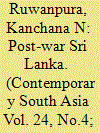| Srl | Item |
| 1 |
ID:
189460


|
|
|
|
|
| Summary/Abstract |
This study discusses a topic that is relatively understudied in economics: looting and destruction of cultural heritage sites and objects during epochs of violence. While economic literature on culture, cultural practices, and cultural institutions is long-standing, overlooked are the economic motivations for heritage (a material expression of culture) destruction, the economic consequences of the destruction, and potential policies for prevention from future destruction. Heritage objects during peace times turn into blood antiquities during violent conflicts. Illicit excavations in one country garnish museums in another. Covering a bird’s-eye view of these topics, the study also highlights prospects for future economic research and reiterates a unique opportunity cultural heritage reconstruction may provide for reconciliation in post-conflict countries.
|
|
|
|
|
|
|
|
|
|
|
|
|
|
|
|
| 2 |
ID:
151238


|
|
|
|
|
| Summary/Abstract |
Sri Lanka has been through vicissitudes of change in the past three decades and its current political order gives the impression of the possibility for a different vision for Sri Lanka. Yet in order to appreciate the continuities and disruptions to Sri Lanka’s polity and the possibility of a politics of reconciliation, the contributors to this special issue argue that we also need to redirect our attention away from the state. It is an initial call that seeks to disentangle the ways in which the various constituents that make up the state, including capital and labour, are also implicated or suffer from a tragic perpetuation of an ethno-nationalist agenda that keeps morphing into various guises at fraught moments. A politics of reconciliation then, it suggests, cannot simply be limited to a political package that does not recognize the very economic disempowerment of large segments of people. The contributors to this special issue come from varying disciplines and adopt a range of methods to explore how this politics of reconciliation is understood, endorsed and contested in the everyday lives of Sri Lankan people.
|
|
|
|
|
|
|
|
|
|
|
|
|
|
|
|